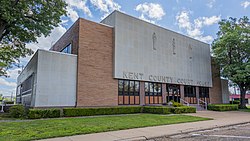Demographics
Kent County, Texas – Racial and ethnic composition
Note: the US Census treats Hispanic/Latino as an ethnic category. This table excludes Latinos from the racial categories and assigns them to a separate category. Hispanics/Latinos may be of any race.| Race / Ethnicity (NH = Non-Hispanic) | Pop 2000 [14] | Pop 2010 [15] | Pop 2020 [16] | % 2000 | % 2010 | % 2020 |
|---|
| White alone (NH) | 777 | 669 | 657 | 90.45% | 82.80% | 87.25% |
| Black or African American alone (NH) | 2 | 6 | 2 | 0.23% | 0.74% | 0.27% |
| Native American or Alaska Native alone (NH) | 1 | 5 | 3 | 0.12% | 0.62% | 0.40% |
| Asian alone (NH) | 0 | 0 | 0 | 0.00% | 0.00% | 0.00% |
| Pacific Islander alone (NH) | 0 | 0 | 0 | 0.00% | 0.00% | 0.00% |
| Other race alone (NH) | 0 | 0 | 3 | 0.00% | 0.00% | 0.40% |
| Mixed or multiracial (NH) | 1 | 8 | 7 | 0.12% | 0.99% | 0.93% |
| Hispanic or Latino (any race) | 78 | 120 | 81 | 9.08% | 14.85% | 10.76% |
| Total | 859 | 808 | 753 | 100.00% | 100.00% | 100.00% |
As of the 2000 census, [17] 859 people, 353 households, and 247 families resided in the county. The population density was less than 1/km2 (2.6/mi2). The 551 housing units averaged about zero point six units per square mile (0.23 units/km2). The racial makeup of the county was 95.46% White, 0.23% Black or African American, 0.35% Native American, 3.73% from other races, and 0.23% from two or more races. About 9% of the population were Hispanic or Latino of any race.
Of the 353 households, 26.1% had children under 18 living with them, 61.2% were married couples living together, 5.9% had a female householder with no husband present, and 30.0% were not families. About 28.0% of all households were made up of individuals, and 14.2% had someone living alone who was 65 or older. The average household size was 2.33 and the average family size was 2.83.
In the county, the population was distributed as 20.6% under 18, 5.4% from 18 to 24, 21.8% from 25 to 44, 26.8% from 45 to 64, and 25.5% who were 65 or older. The median age was 47 years. For every 100 females, there were 91.7 males. For every 100 females 18 and over, there were 91.6 males.
The median income for a household in the county was $30,433, and for a family was $35,568. Males had a median income of $23,875 versus $20,000 for females. The per capita income for the county was $17,626. About 9.20% of families and 10.40% of the population were below the poverty line, including 13.10% of those under age 18 and 6.10% of those age 65 or over.
Politics
In the 2024 Texas Republican presidential primary, Kent County was the only county in Texas that Donald Trump lost.
Throughout the 20th century, Kent County was a reliably Democratic county, having only voted for a Republican three times from 1912 until 2000. Kent County has realigned into a Republican stronghold since George W. Bush won the county in 2000. As of 2024, Kent County has not selected a Democrat in a presidential election since 1996, when then Democratic incumbent Bill Clinton won it.
This page is based on this
Wikipedia article Text is available under the
CC BY-SA 4.0 license; additional terms may apply.
Images, videos and audio are available under their respective licenses.


